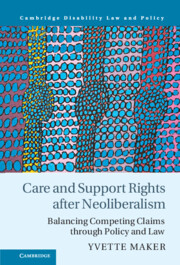Book contents
- Care and Support Rights after Neoliberalism
- Cambridge Disability Law and Policy Series
- Care and Support Rights after Neoliberalism
- Copyright page
- Contents
- Table
- Foreword
- Acknowledgments
- Abbreviations
- Introduction
- Part I Care Policy Tensions
- 1 A Feminist Dilemma
- 2 The Universal Caregiver Model
- 3 Disability Rights and Carers’ Advocacy
- 4 A Disability Rights–Informed Ethics of Care
- Part II Balancing Competing Claims through Rights-Based Policy and Law
- Part III Care and Support Policy Tensions in Two Liberal Welfare States
- Index
- Other Books in the Series
4 - A Disability Rights–Informed Ethics of Care
Interdependence and Common Humanity
from Part I - Care Policy Tensions
Published online by Cambridge University Press: 21 April 2022
- Care and Support Rights after Neoliberalism
- Cambridge Disability Law and Policy Series
- Care and Support Rights after Neoliberalism
- Copyright page
- Contents
- Table
- Foreword
- Acknowledgments
- Abbreviations
- Introduction
- Part I Care Policy Tensions
- 1 A Feminist Dilemma
- 2 The Universal Caregiver Model
- 3 Disability Rights and Carers’ Advocacy
- 4 A Disability Rights–Informed Ethics of Care
- Part II Balancing Competing Claims through Rights-Based Policy and Law
- Part III Care and Support Policy Tensions in Two Liberal Welfare States
- Index
- Other Books in the Series
Summary
This chapter discusses efforts to transcend disagreements between carer and disability rights perspectives in relation to care and support. The tension between these perspectives rests on a dichotomous view of people with disabilities as being either dependent on others and in need of ‘care’ or independent holders of rights. Ethics of care theorists have challenged this dichotomy, arguing that interdependence – both giving and receiving care – must be reconceived as normal and universal human experiences and elements of citizenship. Some disability scholars have engaged with the ethics of care perspective, drawing especially on a human rights perspective on disability, to devise an approach that can recognize and meet care and support needs on the basis of shared dignity rather than shared vulnerability. This would require the introduction of care and support policies that recognize and extend support to people in all forms of care and support relationships, recognize diversity of need, impairment and preference and facilitate the exercise of the full suite of citizenship and human rights. While this approach is promising, some conceptual differences between the carer and disability rights perspectives remain unaddressed, including a persistent tendency to prioritize one side of the care or support relationship over the other.
Keywords
- Type
- Chapter
- Information
- Care and Support Rights After NeoliberalismBalancing Competing Claims Through Policy and Law, pp. 80 - 94Publisher: Cambridge University PressPrint publication year: 2022

